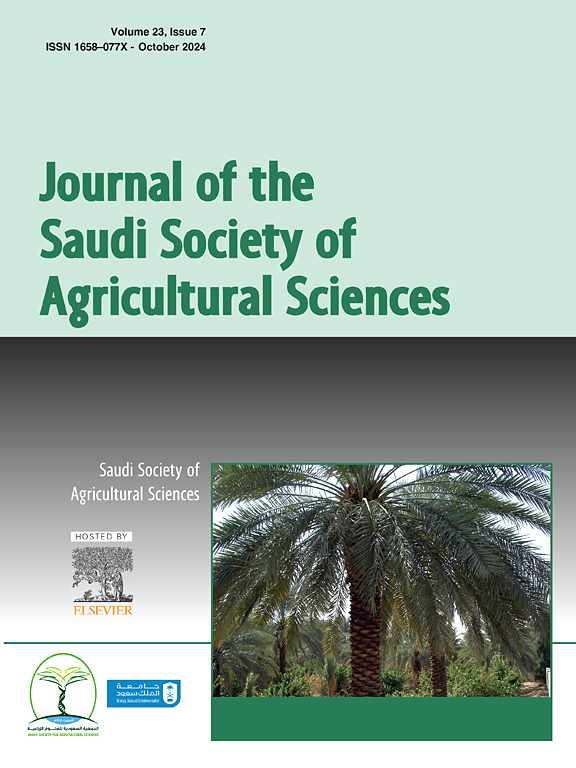Wastewater resources, agricultural practices management strategies, soil salinity predictions and artificial recharge in the Middle East-Saudi Arabia: A review
Q1 Agricultural and Biological Sciences
Journal of the Saudi Society of Agricultural Sciences
Pub Date : 2024-12-01
DOI:10.1016/j.jssas.2024.08.003
引用次数: 0
Abstract
Water scarcity threatens agriculture, domestic, industrial, and food security in the land of Saudi Arabia. The nation produces significant quantities of municipal wastewater, which, with adequate treatment (nanotechnology), could serve as an alternative water source for irrigation, thereby reducing reliance on fossil groundwater and/or surface water. This study assessed the management of water resources for irrigation in KSA. A multi-criteria approach was applied to evaluate the water suitability for domestic and irrigation, including complying with Saudi Standards and the potential salinity (PS) indices. The application of treated wastewater (TWW) irrigation has successfully maintained groundwater sustainability in the study area, as evidenced by increased groundwater levels up to 2 min some aquifers and the equilibrium for other deep aquifers. Although TWW contributes to crop productivity and soil fertility, long-term agricultural sustainability could be enhanced by improving effluent quality, regulating irrigation practices, implementing buffer zones, and monitoring shallow groundwater. Agricultural activities in KSA mixed with return flow irrigation water to deep groundwater increase total dissolved solids (TDS), sodium adsorption ratio (SAR), nitrate (NO3), pesticides, and radionuclide element (40K and 226Ra) concentrations. In intensive agricultural areas (Tabuk, Al Jouf, Al-Qassim, Hail, Riyadh, Al Kharej, Wadi Dawaser, Jazen…), the nitrate levels exceeded 200 mg/l, 226Ra, 232Th, and 40K radioactivity is of the order of 35 Bq/l, 41 Bq/l and 730 Bq/l respectively.
The best methodology plan should orient to improve the management practices and the protection of the water resources and to orient to the unconventional water sources (TWW, collection of drainwater, seawater…) and thirdly move towards rainwater (liquid and vapor) harvesting and the fourth direction is logical sharing between sectors and law enforcement. Water, soil and human health protection are the principal goals of this study.
中东-沙特阿拉伯的废水资源、农业实践管理策略、土壤盐分预测和人工补给:综述
水资源短缺威胁着沙特阿拉伯土地上的农业、家庭、工业和粮食安全。这个国家产生大量的城市污水,这些污水经过适当的处理(纳米技术)可以作为灌溉的替代水源,从而减少对地下水和/或地表水的依赖。本研究评估了沙特阿拉伯灌溉水资源的管理。采用多标准方法来评估家庭和灌溉用水的适宜性,包括遵守沙特标准和潜在盐度(PS)指数。经处理的废水(TWW)灌溉的应用成功地维持了研究区地下水的可持续性,一些含水层的地下水水位增加了2分钟,而其他深层含水层的地下水水位达到了平衡。虽然TWW有助于作物生产力和土壤肥力,但可以通过改善废水质量、规范灌溉做法、建立缓冲区和监测浅层地下水来提高长期农业可持续性。在KSA地区,农业活动与回流灌溉水混合,深层地下水增加了总溶解固体(TDS)、钠吸附比(SAR)、硝酸盐(NO3)、农药和放射性核素元素(40K和226Ra)浓度。在农业集约化地区(Tabuk、Al Jouf、Al- qassim、Hail、Riyadh、Al Kharej、Wadi Dawaser、Jazen…),硝酸盐水平超过200 mg/l, 226Ra、232Th和40K的放射性分别为35 Bq/l、41 Bq/l和730 Bq/l。最好的方法计划应该面向改善管理实践和水资源保护,面向非常规水源(TWW,收集排水,海水……),第三个方向是雨水(液体和蒸汽)收集,第四个方向是部门和执法部门之间的逻辑共享。水、土壤和人体健康保护是本研究的主要目标。
本文章由计算机程序翻译,如有差异,请以英文原文为准。
求助全文
约1分钟内获得全文
求助全文
来源期刊

Journal of the Saudi Society of Agricultural Sciences
Agricultural and Biological Sciences-Agricultural and Biological Sciences (all)
CiteScore
8.70
自引率
0.00%
发文量
69
审稿时长
17 days
期刊介绍:
Journal of the Saudi Society of Agricultural Sciences is an English language, peer-review scholarly publication which publishes research articles and critical reviews from every area of Agricultural sciences and plant science. Scope of the journal includes, Agricultural Engineering, Plant production, Plant protection, Animal science, Agricultural extension, Agricultural economics, Food science and technology, Soil and water sciences, Irrigation science and technology and environmental science (soil formation, biological classification, mapping and management of soil). Journal of the Saudi Society of Agricultural Sciences publishes 4 issues per year and is the official publication of the King Saud University and Saudi Society of Agricultural Sciences and is published by King Saud University in collaboration with Elsevier and is edited by an international group of eminent researchers.
 求助内容:
求助内容: 应助结果提醒方式:
应助结果提醒方式:


